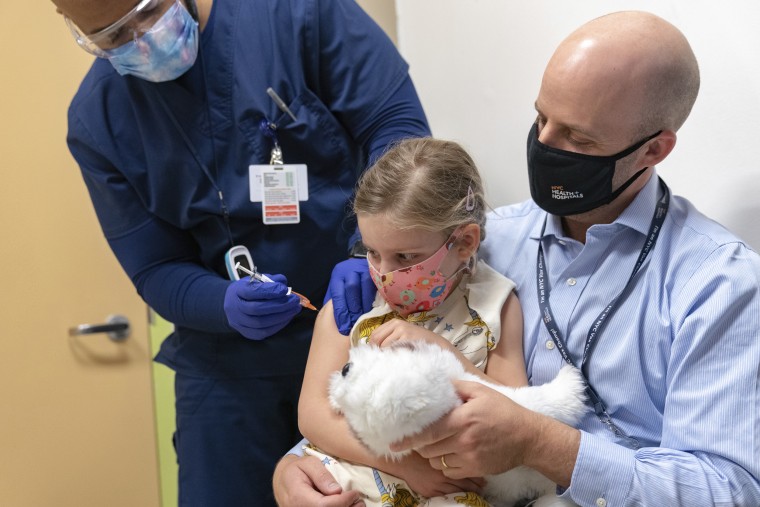Pfizer and BioNTech are testing a third dose of their Covid-19 vaccine in an ongoing trial of children ages 6 months to under 5 years after the companies found that the two-dose regimen didn’t generate a strong enough immune response in some children, the companies announced Friday.
The change to the trial protocol means that the companies won't have data to submit to regulators until the first half of 2022. That's a change from earlier this month, when Pfizer CEO Albert Bourla said the company could have data on young kids by the end of this year.
Full coverage of the Covid-19 pandemic
In a news release posted Friday, the companies said two doses of the vaccine generated a strong immune response in kids under age 2, comparable to what was seen in a trial of 16- to 25-year-olds, but not in the cohort of children ages 2 to under 5.
Kathrin Jansen, Pfizer's head of vaccine research, said on a conference call with investors Friday that data on variants, including omicron, suggest that people vaccinated with three doses of the vaccine may have a higher degree of protection than those with two doses.
"Therefore, we have decided to modify each of the pediatric studies to incorporate a third dose to the series and seek licensure for a three-dose series rather than a two-dose series as originally anticipated," Jansen said.
Jansen's comment comes as health experts debate whether the definition of “fully vaccinated” should be amended to include a booster shot.
Federal health officials are urging all eligible people in the United States to get boosters to combat the threat of the omicron variant. Initial data suggest that three shots of the mRNA vaccines provide adequate protection against the new strain.
Dr. Paul Offit, a vaccine expert at Children's Hospital of Philadelphia, criticized Pfizer's move, saying evidence to date shows that two doses of the vaccine still protect against severe disease.
"To me, the goal of this vaccine is the prevention of serious illness," he said, adding that goal doesn't seem to be shared by many others at this point.
"The goal is no longer just protection against serious illness but protection against infection," he said. "That is not a goal we have for any other vaccine."
Dr. Isaac Bogoch, an infectious disease specialist at the University of Toronto, said that with the emergence of the delta variant and the rise in breakthrough infections, it is clear that the Pfizer vaccine should be a three-dose vaccine for adults.
But when it comes to kids getting three doses, Bogoch said, "I have no idea. As always, we cannot treat kids as little adults."
Pfizer’s two-dose series has been cleared by the Food and Drug Administration for kids as young as 5, but only those 16 and up are eligible for a booster.
Download the NBC News app for full coverage of the Covid-19 pandemic
Pfizer and BioNTech said Friday that an ongoing study for kids ages 6 months to under 5 years will now include a third dose containing 3 micrograms of mRNA given at least two months after the second dose. The companies have been testing the 3 micrograms doses for the age group, and 10 micrograms doses for kids 5 to 11. Everyone ages 12 and up receives 30 microgram doses.
If the trials are successful, the companies said they expect to submit data to regulators to support an emergency use authorization for children ages 6 month to under 5 years in the first half of 2022 with this three-dose series.
The companies said they plan to evaluate a 10-microgram booster in children ages 5 to 11. They've also initiated a study to test a third dose of 10 micrograms or 30 micrograms in about 600 kids ages 12 to 17.
Boosters of the Pfizer vaccine for 16- and 17-year-olds were cleared last week.
Follow NBC HEALTH on Twitter & Facebook.

